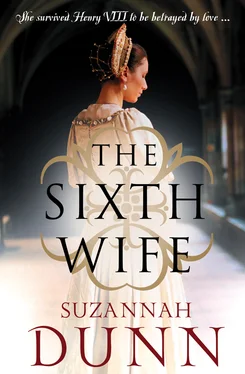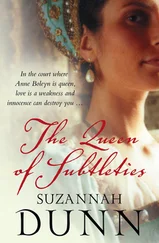This, then, is the truth about Kate, as I know it; this is as close as I can get. She had a happy enough childhood, growing up with a brother and sister, the three of them close. And if her mother wasn’t exactly merry…well, who would be, widowed in her early twenties with three small children? I barely remember Maud but she was, as far as I know, a woman of careful, calculated steps, dedicating the final decade of her life to her children’s education and inheritance. And who does that sound like? Except that Kate failed in the end to follow her mother’s example in one crucial respect. Maud chose to stay a widow.
Maud stayed at court, lodged there with her children and began working long and hard to secure future marriages for her children that would keep the Parr fortune safe. In the meantime, she made a job for herself organising the royal school, a benefit of this being that her own daughters could attend. That’s how Kate had come to have an education fit for Catherine of Aragon’s own daughter. Consider just how good that education had to be. Priceless were those lessons that Kate took alongside Princess Mary from the wonderful Señor Vives. Beebis was what I used to think his name was when I was young, before I realised how it was spelled. Señor Beebis and his glamorous Belgian wife. He was hawkish and sallow but handsome; she was big and blonde, with a habit of affectionately cuffing him. They’d both had heavy accents, but different ones. Juan Luis Vives wasn’t only a man of ideas: he had ideas. One of them – a big one – was that education didn’t come from memorising facts but from asking questions. The biggest, though, surely, was that education was for girls. Especially for girls. Because, he reasoned, a woman needed her wits about her. His school was soon world-famous: its pupils, by the age of twelve, debating with lecturers, lawyers and bishops. In those days, the Princess Mary – heiress of England, studious half-Tudor and half-Castilian waif – hadn’t yet turned into plain old Mary Tudor, narrow-minded Catholic.
Just as I was ready to move on from nursemaids and governesses to the school, it closed. Anne Boleyn was coming to the fore, and Señor Vives had unwisely been persuaded to say a little something in Queen Catherine’s favour. The consequences were worse than he’d anticipated. His services were no longer required. Whatever I’ve learned, I had to learn from Kate: a hand-me-down education, with which she was unstintingly generous.Which wasn’t how she claimed to see it. Once she claimed that it was from me she’d learned what mattered in life. Incredulous, I’d challenged: Learned what? This was how she put it: to have the courage of her convictions. I couldn’t see it. She was courageous, she had convictions. Whereas me, I follow my instincts and I’m stubborn: it’s as simple as that.
She’d tried to explain: ‘What’s your dog called?’
‘ Which dog?’ And, anyway, she knew what my dogs were called.
‘You know which dog. Gardiner.’ My lapdog, named after our principal catholic bishop who also – bad luck – happens to be my godfather. Our principal catholic bishop, preaching celibacy whilst installing a succession of mistresses in his palace. ‘You called him Gardiner,’ she said, ‘so you could make us laugh by calling him to heel.’
‘That’s just me being silly.’
She gave me her wide-eyed look. ‘You’re never just being silly.’
I was determined not to let her take it seriously. ‘It was nothing.’
But she wasn’t having it. ‘Well, here’s something that isn’t nothing then. I was there, remember, that evening, at your house, with all those people, when Charles said every lady had to choose the gentleman they’d most like to take in to dinner, and what did you say?’
Oh, she had me now; I couldn’t suppress a smile at the memory. What a good pair we’d made, Charles and I, if an unlikely one, me being half his size and half his age. (Lucky that I could never have been mistaken for any daughter of his: him, a genial, greying bear of an Englishman, and me a snub-nosed, sharp-tongued half-Spaniard.) The evening in question, I’d gone up to the repellent Stephen Gardiner and said, ‘I’ll do things a little differently; I’ll take the man I like least and that’s you.’
I said to Kate, ‘It was a joke.’
‘He didn’t find it funny, though, did he? He laughed along with everyone else, but you could see he didn’t like it.’
‘Yes, which is why he’s the butt of jokes like that.’ Pompous ass . ‘Look,’ I said, ‘you’re nice, Kate, and I’m not, and that’s all it is.’ I didn’t like the way the conversation was going, her implication that she was somehow lacking. Something I loved about her was her quiet certainty. And why, in any case, should she want to make cheap jokes? That was for me to do.
‘You make your point, Cathy,’ was what she replied. ‘You make people think. You go out on a limb to do that. And I’ve never in my whole life taken even the smallest risk.’
I wonder, now, what Señor Vives would make of what happened to her in the end. Advice to his girls was something he’d undertaken seriously. Yes, there were languages to learn and translations to do, there was astronomy and maths and music, but he was keen, too, for his girls to do well in general. In life. To be happy, no less. Kate told me that he’d advised them never to marry for love. For a man, it was of no consequence, he’d said: a man could marry for love. But not a girl. Because it would render her vulnerable.
Of all the pieces of advice from him, Kate chose to ignore this one.
Eight

It was this, with Thomas: he was often onto something, but he never knew when to stop. That was Thomas’s problem. He was unstoppable. Take that night of the stars. Was he content with a few special moments that arose there in the dark garden? No, because next morning – barely morning, barely even dawn, a mere few hours later – he decided it was the turn of the girls.
I was awake, just; must have been, because I was unaware of being woken. How early was it? Very. I’d heard the clock strike four, but couldn’t recall it striking five. Not dark, nor light.What I’d heard was a girl’s voice, outside, in the grounds. Not the voice of a resentful servant on some extra-early duty, perhaps in the bakehouse, half asleep and matter-of-fact. This was someone wide awake, excited, momentarily forgetting herself before being hushed. And from my window I spied them: Elizabeth – it had been her voice – with little Jane, being led through the garden by Thomas. Only nightgowns beneath their cloaks, the three of them, and the girls’ hair was down; I’d never before seen Jane with her hair down. Her walk was brisk but she was well behind the other two, her reluctance clear. Elizabeth’s hair was like a fox fur. Her lolloping sideways canter was keeping her abreast of Thomas while she chattered at him in a theatrical hush. She loves drama, I realised as I watched.Why do people say there’s none of her mother in her? Her father would have either woken the whole household to join him, or he’d have genuinely enjoyed the secrecy. But her mother would have done exactly as Elizabeth was now doing: making a show of stealing away. The old king had been a showman but Anne Boleyn had loved show, and there’s a difference: Henry had drawn people in, Anne had wanted them to see what they were missing.
Unwittingly, I was Elizabeth’s audience. I’m all for high jinks, believe me, but this? A grown man prancing around in his nightgown in the early hours with two girls entrusted to his wife’s care? A man who had been suspected of having had too close an interest in one of the girls. A girl who wasn’t just a girl but a princess. Was that why Jane had been drawn into the escapade, as alibi, chaperone? They slipped from view and I attempted to follow them, leaving my room without waking Bella, but then I saw Elizabeth’s governess, Mrs Ashley, in her nightdress, at a window far down the hallway. ‘Mrs Ashley?’
Читать дальше













